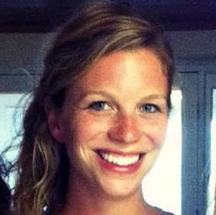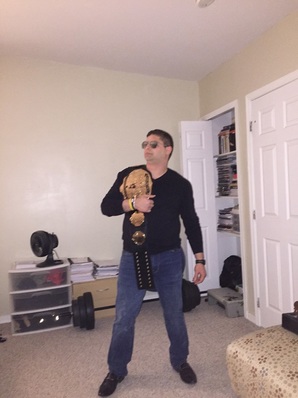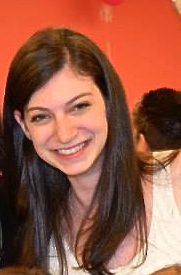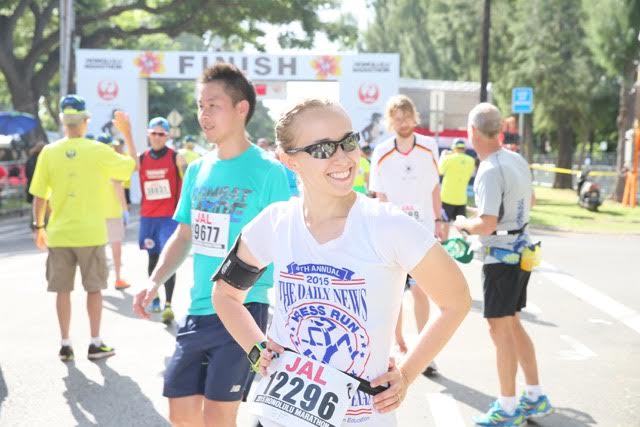Liz Gale-Benz has been working hard to keep our Campus Representatives in the loop ever since she was elected to be your CR Coordinator in 2014. We count ourselves very lucky to have such a friendly, organized, hard working woman in her position -- and you should too! Have a question about becoming a CR? You can always get more information about the program on our website, but feel free to chat with Liz at AP-LS next week!What first got you interested in this law-psychology?
I have always been interested in social justice, and I think the intersection of law and psychology provides a unique lens through which these issues can be explored. What is your favorite city? I have two! Chicago is one of my most favorite cities, and I studied abroad in Vienna, Austria during my third year of college so I will always love Vienna. Both are incredible cities! What is your favorite thing about being on the Student Committee? I love being able to work with all of the wonderful Campus Representatives! What is the best thing about the AP-LS Conference? Being able to attend so many interesting presentations! It is always fun to learn new information within so many different areas of law and psychology, and to be able to support my colleagues. What will you miss about being in grad school? I will miss everyone in my lab and being at Drexel, but I will be very excited for the next step in my career!
0 Comments
We value a sense of humor here on the Student Committee, and you Law Liaison Jaymes Fairfax-Columbo has that in spades (see photo below). However, he takes his job on the Student Committee very seriously and looks out for all of you legal-minded students out there. Be sure to check out our pre-conference workshop on Thursday, March 11th at 10AM to see him in action.Have you ever had a job you really loved? I loved my job as a research assistant at the Treatment Research Institute—it helped solidify my decision to pursue the JD/PhD degree (I got turned down the first time I applied, believe it or not). But the best job I think I ever had was as a student librarian at Swarthmore. I was the face of the library—I even got listed as one of the “hottest librarians” in one of the men’s bathroom stalls in the basement (my friend took a picture and texted me “congratulations.”) Plus, it paid dividends outside of the work-study money. In my junior year, I was a participant in a glorified male beauty pageant, Mr. Swarthmore, as the cross country representative. Now, I consider myself a talented person, but unfortunately none of those talents really translate to a talent show. So, I decided to go for some comedic relief and was an “extreme librarian” who could perform the most basic of library tasks even under severe duress. It involved me getting pied in the face at one point, so it was worth it. People were super into it and I got lots of compliments—didn’t win the competition, though. Sometimes people let gold slip through their fingers! If you weren't in grad school, what would you be doing instead? Professional wrestler. Next question. Do you have any hidden talents? I’m really good at writing and performing comedic raps, particularly of the birthday variety (but not freestyling). I broke it out a few times in high school, college, and believe it or not, on graduate school interviews, but haven’t really tapped into it since then. What is your favorite city? Philadelphia in the United States, hands down. If you move to the City of Brotherly Love, you’ll understand. Worldwide, Edinburgh. Not because that’s where Harry Potter was written (though that’s a plus), but because of the Royal Mile and Arthur’s Seat. What is the best thing about the AP-LS Conference? Rubbing elbows with some of the best and brightest forensic minds in the country, seeing lots of awesome talks, coming home with a ton of research ideas, and being able to see friends you only get to see once a year. What will you miss about being in grad school? Not having to pay bills. Oh wait, that was college. In reality, being surrounded by lots of great like-minded peers and not being expected to be an expert on things just yet—if I say something less-than-enlightening, I can always fall back on the “I’m just a student” excuse. What is one professional goal that you have? When I was in middle school, I wanted to be a historian, mainly because I thought the job of a historian was to narrate History Channel specials. Turns out that’s not what they do—Morgan Freeman does that. But, alas, Morgan Freeman is approaching retirement, and somebody needs to take up the reigns. So I’m gonna go with narrating a History Channel special on the history of forensic psychology in the United States. And being quoted in Men’s Health. And maybe to make a solid contribution to translating research into policy and dissemination of research knowledge to the public-at-large. Not necessarily in that order, but maybe. Meet Shelby Arnold, your Clinical Liaison! Shelby is a PhD student in Clinical Psychology at Drexel University, and looks out for the interests and concerns of our clinically-minded AP-LS students. In addition to having some really great experiences under her belt, Shelby is confident and organized as well as a lot of fun to work with. She is a great peer role model and representative, so don't miss a chance to say hi if you see her at the conference!
You may have interacted with her last year while she was our Communications Officer, or perhaps you know her as your current Experimental Liaison. Either way, Cait has been helping our student members get the most out of AP-LS in whatever way she can. Make sure to say hi when you see her at the conference next month!
If you made it to our Student Committee panel at last year's AP-LS conference, you were lucky enough to hear Dr. Eve Brank, JD, PhD speak about ways to get hired in psychology and law. Dr. Brank is currently an associate professor of psychology in the Law-Psychology program at the University of Nebraska-Lincoln (UNL), and has served on faculty search committees as UNL as well as the University of Florida. She is also a good friend to the Student Committee, and the Treasurer for AP-LS. This blog entry is one of three authored by Dr. Brank, so be on the lookout for more great posts from her in the future!In academia we perch daily on our three-legged stools of research, teaching, and service. Those three words are the categories in my google calendar—color-coded like they were different children’s activities. Some days, the whole day is yellow (my color for service), while others have a lovely rainbow of yellow, purple (research), and orange (teaching). The goal, of course, is to spend as much time and have as much impact as possible on purple—I mean, research. You see, although we sing, “Research, Teaching, and Service,” we face pressure to make the research leg of our stool to be much larger than the other two. And, not just any research. No, what is important are grants and peer-reviewed publications, and that is also what we want our job candidates to have.
What can a graduate student do to get grants and peer-reviewed publications? Like the audience who attended the live session, I commend you for reading this and taking proactive steps now. If you are early in your graduate school career, then that is even better and I give you more commendation. By starting your research story early, you can make everything count. As an example, if you are taking a social psychology class that has a paper requirement, don’t pick some random topic for your paper. Instead, pick a topic that fits with your research or complements your research. In my lab we take this one step further and meet as a group to discuss all the students’ paper assignments for the semester. If we have a manuscript or grant proposal that needs a literature review and that topic fits one of the classes a student is in, then perfect! Two birds—one literature review draft. Also, be sure your conference presentations are turning into publications. Sometimes it takes a couple of presentations to make up a manuscript, but the goal should always be to have publications and not just presentations. Think of presentations as a means to an end. Presentations give you the opportunity for feedback (and sometimes collaborations) from colleagues outside your university, force you to make progress on a project, and provide you a reason to visit places like San Diego in March. Although I might be jealous of all the cool places a person has visited and presented their research, a long list of only presentations and no publications on a CV will not impress me. What about teaching? Well, despite the universal sigh of relief at semester’s end when the student parking lot is empty, we do prioritize teaching at large research universities. And, most of us actually like teaching and we want our new colleagues to like it and be good at it too. So, yes, you need some teaching experience, but don’t let it eclipse your research. The best advice I received about teaching was that my teaching record won’t help me, but it could hurt me. You need the teaching experience and you need to do it well – that’s the expectation. So, get some experience and it’s even better if that experience is in core classes that departments usually need people to teach. Finally, how much service should you do? The truth is that service won’t get you a job. Faculty search committees do not say, “She doesn’t have any publications or teaching experience, but she planned the department picnic and served on the graduate student senate! Give this woman a job!” The best kind of service to do is the kind that advances your research or builds collaborator networks. There will be plenty of time when you have tenure to do service that fulfills your soul and allows you to give back to your profession-- trust me, I’m the one who got roped into – I mean volunteered to write this blog post aren’t I? Ever wonder who is behind all of those #SomethingfunSunday posts? Well, wonder no longer. Meet Dana Formon, your Communications Officer. Dana works hard to keep you all up to date via our Twitter and Facebook accounts as just one of her many responsibilities on the Student Committee. On top of being a hard worker, she is very friendly and committed to our student members. Keep an eye out for her at the upcoming March conference! What first got you interested in law and psychology? My first interest in this field was actually when our Student Chair, Meghann Galloway, TA’d the lab portion of my Intro to Psychology course at Drexel University (for real!). On the first day of class she told us about her experiences interning at the FBI and I just remember being really interested in her experience and wanted the same for myself. With her help, I was able to join a forensic research lab on campus and it was history from there! I have just always found every aspect of this psychology-law really interesting, which was meaningful to me, so I decided to stick with it. If you weren't in graduate school, what would you be doing instead? I’d want to travel with either the Peace Corps or Remote Area Medical. Do you have any hidden talents? I used to be a part-time professional modern dancer, so I have a knack for anything related to physical activity (except playing DDR for some reason). I really enjoy doing half-marathons, full marathons, and multi-sport events…but I don’t know if you could consider them talents perse because I think anyone is capable of doing those things. :) What is your favorite thing about being on the Student Committee? The people I work with! I find that more always gets accomplished when you have a group in charge, and I love how we get together to share ideas and make fun things happen for AP-LS and especially the student members of AP-LS. Everyone on the committee always has great things to bring to the table and our fearless leader has a really great vision for how we can improve upon what the Student Committee does for it’s members. What is your favorite thing about AP-LS? I really like the networking opportunities you get. I feel like the AP-LS Conference is the one place where I can listen to a research presentation, get really excited, and then run up to the researcher after the fact and just start throwing around questions and ideas. I feel like our field at large is really interesting, and the people who do the really interesting research are always very helpful and wonderful to talk to. If you ask one question about someone’s research, chances are it’ll turn into an amazing 15-minute conversation and lots of potential for collaboration. What is one of your professional goals? I want to be able to tie my forensic interests into my hobbies. I love animals, and I love running…so a professional goal I have for myself would definitely be to either begin a K9 rehabilitation program in a correctional facility (since that’s already something some facilities do), or to start an exercise program or running club for offenders (or ex-offenders as part of a rehabilitation program). If I could achieve both, I’d die so very happy |
About the Editor:
The American Psychology-Law Society (Division 41 of the American Psychology Association) Student Committee is composed of elected student leaders representing the interests of our student members. Categories
All
Archives
June 2024
|
|
Except where otherwise noted, content on this site is licensed under a Creative Commons Attribution 4.0 International license. Icons by Icons8
|
|






 RSS Feed
RSS Feed
